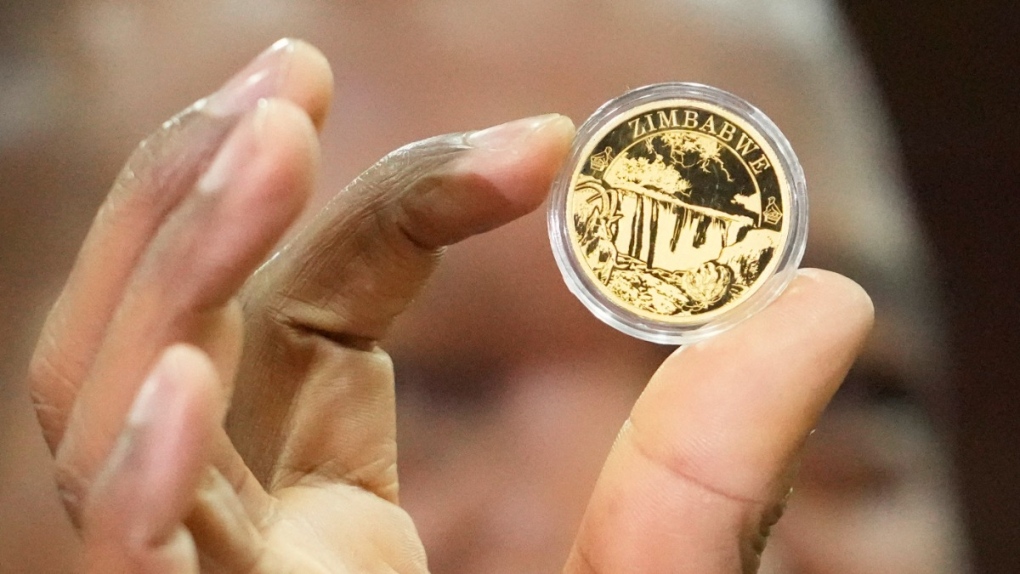“Holders of physical #gold coins, at their discretion, will be able to exchange or convert, through the banking system, the physical gold coins into gold-backed #digitaltokens,” the Reserve Bank of Zimbabwe says.
- Introduction
- What are gold-backed digital tokens?
- Benefits of gold-backed digital tokens
- Security and transparency
- Accessibility and liquidity
- Stability and value retention
- The launch of gold-backed digital tokens in Zimbabwe
- Motivation behind the initiative
- How the tokens will be implemented
- Potential impact on the economy
- The role of the Reserve Bank of Zimbabwe
- Steps to exchange physical gold coins for digital tokens
- Process and requirements
- Potential challenges and solutions
- Comparison with other forms of gold investment
- Future prospects and global implications
- Conclusion
- FAQs
- What are the advantages of gold-backed digital tokens?
- Can anyone exchange physical gold coins for digital tokens?
- How will the launch of gold-backed digital tokens affect the Zimbabwean economy?
- Is investing in gold-backed digital tokens a safe option?
- Are gold-backed digital tokens available internationally?
- Get Access Now
Article
#Zimbabwe is launching gold-backed digital tokens.
In an innovative move, the Reserve Bank of Zimbabwe is set to introduce gold-backed digital tokens, allowing holders of physical gold coins to exchange or convert them into these digital assets through the banking system[^1^]. This groundbreaking initiative aims to leverage the benefits of blockchain technology and bridge the gap between traditional physical gold investments and the digital realm. In this article, we will explore the concept of gold-backed digital tokens, the advantages they offer, and the implications of their launch in Zimbabwe.
What are gold-backed digital tokens?
Gold-backed digital tokens are cryptocurrencies or digital assets that represent ownership or entitlement to a specific amount of physical gold. These tokens are typically created on a blockchain platform, providing a decentralised and secure infrastructure for transactions and record-keeping. Each token is backed by a corresponding amount of physical gold held in reserve, ensuring its value and stability.
Benefits of gold-backed digital tokens
Gold-backed digital tokens offer several advantages that make them an attractive investment option for individuals and institutions alike.
1. Security and transparency
By leveraging blockchain technology, gold-backed digital tokens provide enhanced security and transparency. Every transaction involving these tokens is recorded on the blockchain, creating an immutable and auditable history. This feature not only ensures the integrity of the ownership records but also mitigates the risk of fraud or manipulation.
2. Accessibility and liquidity
Unlike physical gold, which can be cumbersome to store and trade, gold-backed digital tokens offer enhanced accessibility and liquidity. These tokens can be easily bought, sold, and transferred online, eliminating the logistical challenges associated with physical gold transactions. Furthermore, fractional ownership of gold becomes possible with tokens, allowing investors to participate with smaller amounts.
3. Stability and value retention
Gold has long been considered a safe-haven asset due to its intrinsic value and ability to retain purchasing power over time. Gold-backed digital tokens inherit these characteristics, offering stability and value retention in a digital form. The underlying physical gold reserves provide reassurance that the tokens are backed by a tangible asset, reducing the volatility often associated with other cryptocurrencies.
The launch of gold-backed digital tokens in Zimbabwe
The introduction of gold-backed digital tokens in Zimbabwe marks a significant step toward embracing digital innovation in the country’s financial sector. This initiative is driven by the desire to modernise the gold market, attract new investors, and enhance financial inclusion.
The Reserve Bank of Zimbabwe, as the central authority responsible for the country’s monetary policy, will play a crucial role in overseeing the implementation and regulation of these tokens. The bank aims to ensure that the tokens adhere to strict standards and operate within a secure and transparent framework.
Steps to exchange physical gold coins for digital tokens
The process of exchanging physical gold coins for gold-backed digital tokens will involve several steps to ensure a smooth transition and proper verification of ownership.
- Verification and authentication: Individuals or entities wishing to exchange their physical gold coins for digital tokens will need to undergo a verification and authentication process. This may involve providing documentation to prove ownership of the gold coins and complying with any regulatory requirements set by the Reserve Bank of Zimbabwe.
- Opening a digital wallet: Once the verification process is complete, the next step will be to open a digital wallet. A digital wallet is a secure online platform that allows users to store and manage their digital tokens. This wallet will be used to hold the gold-backed digital tokens received in exchange for the physical gold coins.
- Transfer of ownership: After the digital wallet is set up, the physical gold coins will need to be transferred to a designated authority or institution approved by the Reserve Bank of Zimbabwe. This transfer of ownership will be documented and recorded to ensure transparency and prevent any fraudulent activities.
- Conversion process: Once the physical gold coins are received and ownership is verified, the conversion process will take place. The designated authority or institution will facilitate the conversion of the physical gold coins into an equivalent amount of gold-backed digital tokens. This conversion will be based on the prevailing market value of gold at the time of the transaction.
- Confirmation and transfer of digital tokens: After the conversion, the digital tokens will be credited to the individual’s digital wallet. The transaction will be recorded on the blockchain, providing a transparent and immutable record of ownership. The digital tokens can now be used for various purposes, such as trading, investment, or as a medium of exchange.
Potential challenges and solutions
While the launch of gold-backed digital tokens in Zimbabwe brings numerous benefits, there may be challenges that need to be addressed:
- Security concerns: Ensuring the security of digital wallets and protecting against cyber threats will be of utmost importance. Robust security measures, such as encryption and multi-factor authentication, should be implemented to safeguard users’ assets.
- Education and awareness: It will be crucial to educate the public about gold-backed digital tokens, their advantages, and the process of exchanging physical gold coins for digital assets. Awareness campaigns and educational materials can help address any misconceptions and build trust among potential users.
- Regulatory framework: The Reserve Bank of Zimbabwe will need to establish a comprehensive regulatory framework to govern the issuance, trading, and storage of gold-backed digital tokens. Clear guidelines and oversight mechanisms will ensure compliance and protect investors’ interests.
- Infrastructure and accessibility: The availability and accessibility of digital infrastructure, such as internet connectivity and reliable digital platforms, will be vital for the widespread adoption of gold-backed digital tokens. Efforts should be made to enhance infrastructure and provide equal access to all segments of the population.
In conclusion, the launch of gold-backed digital tokens in Zimbabwe represents a significant step towards modernising the gold market and embracing digital innovation in the financial sector. These tokens offer enhanced security, accessibility, and stability, bridging the gap between traditional physical gold investments and the digital world. As the Reserve Bank of Zimbabwe oversees the implementation of this initiative, it is expected to have a positive impact on the economy, attracting new investors and promoting financial inclusion. The exchange process from physical gold coins to digital tokens will involve verification, authentication, and conversion, ensuring transparency and adherence to regulatory standards. With proper infrastructure, education, and regulatory frameworks in place, gold-backed digital tokens have the potential to revolutionise the way individuals invest in and interact with gold assets.
FAQs
- What are the advantages of gold-backed digital tokens? Gold-backed digital tokens offer enhanced security, accessibility, and stability
over other forms of gold investment. They provide a transparent and auditable record of ownership, making them secure and reliable. Additionally, these tokens offer increased accessibility and liquidity compared to physical gold, as they can be easily bought, sold, and transferred online. Moreover, their value is backed by physical gold reserves, providing stability and value retention.
- Can anyone exchange physical gold coins for digital tokens? The exchange process is typically open to individuals or entities who can provide proper documentation to verify their ownership of the physical gold coins. The specific requirements and procedures may be set by the Reserve Bank of Zimbabwe or the designated authorities overseeing the conversion process.
- How will the launch of gold-backed digital tokens affect the Zimbabwean economy? The launch of gold-backed digital tokens is expected to have positive implications for the Zimbabwean economy. It can attract new investors, both domestic and international, who are interested in the benefits offered by digital assets. This increased investment and participation in the gold market can contribute to economic growth and stimulate financial activities.
- Is investing in gold-backed digital tokens a safe option? Investing in gold-backed digital tokens can be considered relatively safe due to the backing of physical gold reserves. The transparent nature of blockchain technology and the oversight provided by the Reserve Bank of Zimbabwe add an additional layer of security. However, as with any investment, it is important for individuals to conduct thorough research and consider their risk tolerance before making investment decisions.
- Are gold-backed digital tokens available internationally? While the launch of gold-backed digital tokens may initially be specific to Zimbabwe, the concept of gold-backed digital tokens is not limited to a particular country. Similar initiatives or platforms may exist in other countries or be accessible to international investors. The availability of gold-backed digital tokens internationally would depend on the development of relevant infrastructure and regulatory frameworks in each jurisdiction.














